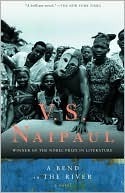More on this book
Community
Kindle Notes & Highlights
It was in the history of the land: here men had always been prey. You don’t feel malice towards your prey. You set a trap for him. It fails ten times; but it is always the same trap you set.
The people were malins because they lived with the knowledge of men as prey.
Malins were slick, quick, cunning, predatory, maybe even admired in a way, for their ability to take advantage. Is this, all men as prey, the point of the book? All characters look at others ultimately as something existing for exploitation, as prey?
He was no longer concerned about being a particular kind of African; he was simply an African, himself, ready to acknowledge all sides of his character.
It didn’t make him easier. He abandoned politeness; he became aggressive and perverse, over a secret nervousness. He began to stay away from the shop and flat. I expected that; it was his way of demonstrating, after the great fright of the rebellion, that he could do without me.


